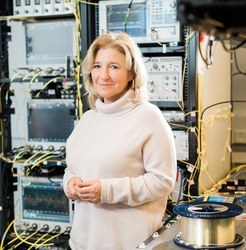
Meet the scientist who wires the world
Journalist David Edmonds profiles UCL's Professor Polina Bayvel, who develops optical communications technology that brings us the internet and much more.
Every time you join an online meeting, stream a movie, search a webpage or upload a photo to social media, you have reason to be grateful to Polina Bayvel. Professor Bayvel has devoted her life to making our optical communications system both faster and cheaper.
When the technique for guiding light energy along optical conductors was first proposed, in 1966, the company involved boasted of its potential. They thought that, with time, it might be possible to transmit one gigabit of information per second. A gigabit has nine zeros. But today we can transmit 200 terabits; a terabit has 12 zeros.
In response to technical breakthroughs, there are now millions of miles of optical fibre cables both under the sea and below our feet on land. Optical fibres are very long tiny rods of glass or plastic, about the width of a human hair. They’re the backbone of our digital communications infrastructure.
The key challenge in sending information through optical fibres is how to avoid the loss of light, or the data becoming corrupted during transmission. Information is transmitted by light pulses sent along the fibre, bouncing off the tube as it travels. The further the light journeys, the more likely things are to go wrong.
Polina Bayvel’s lab researches the whole infrastructure involved in the process. For example, discovering that you could put multiple wavelengths down a single fibre and investigating how best to use amplifiers to boost light pulses when they become too weak to go on. A puzzle they want to crack in the future is how to make the whole system more “intelligent” so that it can predict and respond to periods of high demand in different places.
When Professor Bayvel established the lab in 1994 it became the first university lab in the UK and one of the very few in the world dedicated to the study of optical communications systems. She has about 25 researchers working with her in a small, but well kitted out lab. It can be used to transmit data the equivalent of half-way round the world. This year, during lockdown, her group broke an information speed record. If you had this technology at home, you could download a complete film library in two minutes.
Polina Bayvel was born in Ukraine. In 1978 she emigrated with her family to the UK. Polina’s father had corresponded with the late Chief Rabbi Immanuel Jakobovits, who lobbied the Foreign Secretary, David Owen, who personally signed off on their visas. In 2018, 40 years after arriving in Britain, she wrote to thank him, and he responded by taking her for lunch at the House of Lords. She says she’s grateful to the Jewish community for helping them settle into the UK.
In the UK, she attended Hasmonean High School, where she says she had inspiring teachers, and then studied electrical engineering at UCL followed by a PhD. For a few years she worked in the private sector, before returning to academia.
Her outstanding work has been recognised with a CBE and election to the Royal Society, and she’s featured on the BBC’s Life Scientific. Her family left the USSR to be openly Jewish, so not surprisingly her religion and Jewish identity remain central to her life. She insists there’s no conflict between her science and her religion: one is about evidence and proof, she says, the other about faith.
Read more
Professor Polina Bayvel is the Head of the Optical Networks Group (ONG) in the Department of Electronic & Electrical Engineering at UCL and a supervisor on the Centre for Doctoral Training in Connected Electronic & Photonic Systems (CEPS CDT).
Author David Edmonds works for the BBC and Oxford University’s Uehiro Centre for Practical Ethics.
Full article: www.thejc.com
Published: January 8, 2021, The Jewish Chronicle.
Photo credit: James Tye, UCL
